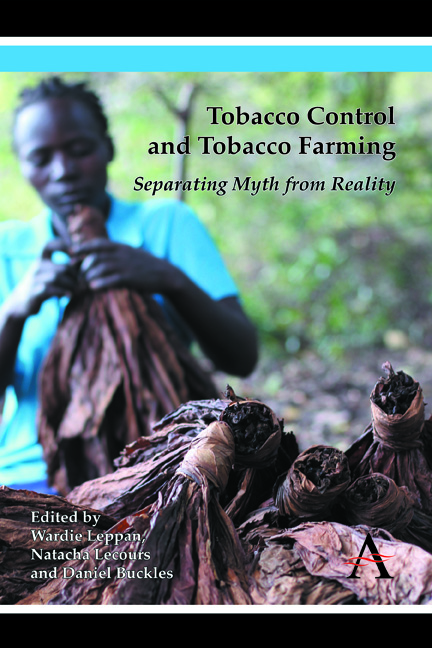Book contents
- Frontmatter
- Contents
- List of Figures, Tables and Photographs
- Foreword
- Preface
- Introduction: Separating Myth from Reality
- Section One The Determinants of Tobacco Leaf Demand
- Chapter 1 Determinants and Likely Evolution of Global Tobacco Leaf Demand
- Chapter 2 Tobacco Leaf Farming in Lebanon: Why Marginalized Farmers Need a Better Option
- Chapter 3 “Gentlemen, Why Not Suppress the Prices?”: Global Leaf Demand and Rural Livelihoods in Malawi
- Section Two Tobacco-Farming Conditions in Low- and Middle-Income Countries
- Section Three Economically Sustainable Alternatives to Tobacco
- Conclusion: Reframing the Debate on Tobacco Control and Tobacco Farming
- Annex: A Policy Brief on Tobacco Control and Tobacco Farming
- Contributors
Chapter 3 - “Gentlemen, Why Not Suppress the Prices?”: Global Leaf Demand and Rural Livelihoods in Malawi
from Section One - The Determinants of Tobacco Leaf Demand
Published online by Cambridge University Press: 05 November 2014
- Frontmatter
- Contents
- List of Figures, Tables and Photographs
- Foreword
- Preface
- Introduction: Separating Myth from Reality
- Section One The Determinants of Tobacco Leaf Demand
- Chapter 1 Determinants and Likely Evolution of Global Tobacco Leaf Demand
- Chapter 2 Tobacco Leaf Farming in Lebanon: Why Marginalized Farmers Need a Better Option
- Chapter 3 “Gentlemen, Why Not Suppress the Prices?”: Global Leaf Demand and Rural Livelihoods in Malawi
- Section Two Tobacco-Farming Conditions in Low- and Middle-Income Countries
- Section Three Economically Sustainable Alternatives to Tobacco
- Conclusion: Reframing the Debate on Tobacco Control and Tobacco Farming
- Annex: A Policy Brief on Tobacco Control and Tobacco Farming
- Contributors
Summary
Introduction
As the world's top burley tobacco leaf producer, Malawi is at the center of global discussions on the human costs of tobacco growing and the economic implications of tobacco control. On the one hand, health activists advocate in favor of alternative livelihoods and diversified crops while publicizing the harmful effects of tobacco growing. On the other hand, tobacco industry representatives and their supporters argue that tobacco control will quickly destroy Malawi's leaf sector and national economy. Some industry advocates have even described efforts to curtail smoking as a “new form of imperialism” by health advocates against tobacco farmers, jobs and national revenue (Assunta 2012). This kind of rhetoric and more direct influence on government officials are routinely used to derail health policy making in Malawi and internationally. Not surprisingly, Malawi currently has very weak tobacco-control policies and regulations (Otañez et al. 2009; WHO 2011). Meanwhile, the perspective of tobacco farmers and farm workers on fairness and control of their own destinies is buried and out of sight.
This chapter examines Malawi's tobacco leaf sector and counters industry arguments that tobacco-control measures harm jobs, revenues and livelihoods in Malawi. We focus on the following questions: What are the structural determinants of demand for tobacco leaf in Malawi? What are the main drivers of changes in the country's tobacco leaf market (quantities and prices for tobacco leaf)? What is the relative importance of demand-side tobacco-control interventions, as compared to other factors, in shaping the evolution of tobacco leaf demand in Malawi?
- Type
- Chapter
- Information
- Tobacco Control and Tobacco FarmingSeparating Myth from Reality, pp. 61 - 96Publisher: Anthem PressPrint publication year: 2014

